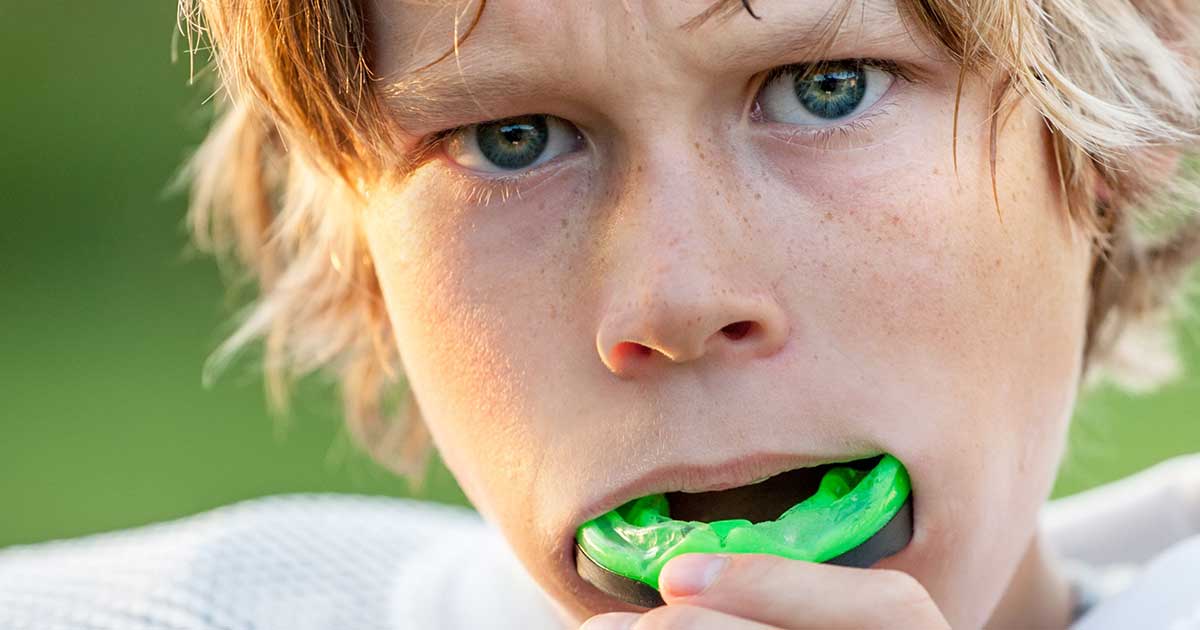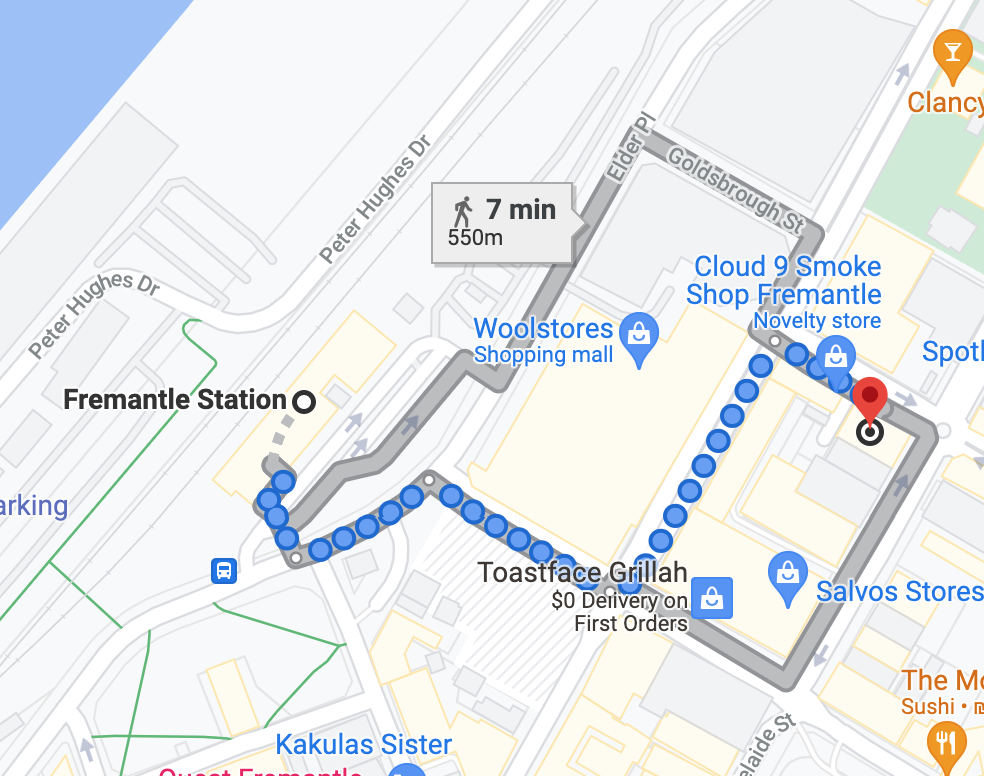At On Point Dental we provide custom mouth guards for people of all ages. Our dentists will take a mould of your mouth to make sure you get a perfect fit.
What type of mouth guard do you need?
Depending on your situation, we may recommend that you wear one of the following types of dental mouthguards:
Sports mouth guards
(Athletic mouthguards) cover the upper teeth and are worn while playing sports that can put your teeth at risk of injury, such as rugby, football and hockey. Sports mouthguards can also be worn with braces and aligners.
Bruxism mouth guards
(Night Splints) are worn at night if you have the habit of grinding your teeth (bruxism). They may only cover the upper teeth or both upper and lower teeth. If you have severe bruxism, your mouthguard needs to be made of a stronger and thicker material to make sure your teeth will be protected.
How are mouth guards made?
To make sure your mouthguard is comfortable and offers all the protection you need, your dentist will take an impression of your teeth using soft putty. Your custom-fitted mouthguard will then be produced in our lab, made from strong acrylic that conforms exactly to the shape of your mouth.
The thickness of your mouthguard depends on its purpose. For most bruxism cases, a thin mouthguard may be all that’s needed. However, if your teeth grinding is causing damage to your teeth and putting a strain on your jaw, you’ll need a thicker mouthguard. Sports mouth guards are also made from thicker acrylic to offer maximum protection.
What are the benefits of custom-fitted mouth guards?
Custom mouth guards don’t lose their shape over time, offering long-term protection for your teeth. They prevent your teeth from moving and are designed to be comfortable for as long as you need to wear them.
Wearing a bruxism night splint prevents your teeth from grinding together at night. A mouthguard can reduce pain and discomfort in your mouth and jaws, reduce strain on the temporomandibular joint (TMJ) and even stop your bruxism over time.
Your dentist will advise you how long you need to wear your mouthguard for and how to keep it clean and hygienic between uses.

Custom-fitted mouthguards versus over-the-counter mouthguards
Sports mouthguards can be bought off the shelf, but as these are not designed to fit your mouth, they are less comfortable to wear and offers less protection against injuries. They can even cause damage to your teeth if you wear them for longer than recommended.
Wearing a store-bought mouthguard can also cause difficulty speaking or breathing, which isn’t the case for custom-fitted splints. They are also much less durable, losing their shape over time and needing to be replaced sooner.
Over-the-counter mouthguards can’t be worn with braces and aren’t suitable for wearing at night. If you need a night splint for bruxism, this needs to be custom-fitted by your dentist.
Mouth Guards – FAQs
What does a mouth guard do?
A mouth guard serves various purposes, catering to different needs and activities. The primary purpose of a mouth guard is to protect the teeth, jaw, and surrounding structures.
For those who suffer from bruxism or teeth grinding, a specialised mouth guard for bruxism can act as a protective barrier, preventing enamel wear, fractures, and jaw pain caused by the clenching and grinding of teeth during sleep. Additionally, individuals engaged in contact sports like boxing or hockey often use boxing mouth guards or hockey mouth guards to shield their teeth from impact, reducing the risk of dental injuries.
Beyond sports and dental protection, mouth guards have found applications in addressing snoring issues. It’s common to use a mouth guard for sleeping if you have trouble with snoring or bruxism. Snoring mouth guards are designed to reposition the jaw or tongue to keep the airway open, reducing snoring and promoting better sleep. These devices are commonly used as a non-invasive solution for individuals with mild to moderate sleep apnea or snoring problems.
Whether it’s for protecting your teeth during sports, managing teeth-griding, or addressing snoring concerns, the versatility of mouth guards means they provide simple yet effective solutions to various oral health and sleep-related issues.
What are common uses of mouth guards?
Mouth guards serve various common uses, providing protection and support in different scenarios:
- Sports Protection: Mouth guards are commonly used in contact sports such as football, basketball, and hockey to safeguard the teeth and mouth from impacts, collisions, and injuries.
- Teeth Grinding (Bruxism): For individuals who grind their teeth during sleep (bruxism), a specialised night guard can prevent enamel wear, jaw pain, and other issues associated with teeth grinding.
- Sleep Apnea and Snoring: Mouth guards designed for sleep apnea or snoring reposition the jaw or tongue to keep the airway open, reducing snoring and improving airflow during sleep.
- TMJ Disorders: Mouth guards can provide relief for temporomandibular joint (TMJ) disorders by promoting proper jaw alignment and reducing clenching or grinding that contributes to TMJ-related pain. There are a range of available TMJ mouth guards over counter solutions.
- Orthodontic Treatment: Mouth guards are sometimes used to protect the mouth and lips from braces or other orthodontic appliances, reducing the risk of injury during physical activities.
- Jaw and Facial Protection: In addition to protecting teeth, mouth guards can help prevent injuries to the jaw, lips, and face, especially during high-impact activities.
- Speech Improvement: Some individuals, especially those with conditions affecting oral musculature, may use mouth guards as part of speech therapy to improve articulation.
Understanding the specific purpose of a mouth guard and selecting the right type for a particular use is essential for maximising its effectiveness. Our team at On Point Dental can help answer any further questions you may have.
What types of mouthguards are there?
There are several types of mouthguards designed to cater to different needs and preferences:
- Stock Mouthguards: These pre-made, ready-to-wear mouthguards are available in standard sizes. While convenient, they offer limited customisation and may not provide an optimal fit.
- Boil-and-Bite Mouthguards: Made from a thermoplastic material, these mouthguards can be softened in hot water and then moulded to fit the individual’s teeth. They offer a better fit than stock mouthguards and are available at many sporting goods stores.
- Custom-Fitted Mouthguards: Dental professionals create these mouthguards based on unique impressions of your teeth. Custom-fitted mouthguards offer the best fit and protection, especially for sports or activities where impact is a concern.
- Thin Mouth Guard: Some individuals prefer thin mouth guards, which are less bulky and more comfortable for certain activities. These may include activities where speech clarity is important, or for individuals who grind their teeth and want a less intrusive option.
- Night Guards: Specifically designed for individuals with bruxism or teeth grinding, night guards are often thin and worn during sleep to protect teeth from the effects of grinding.
The choice of a mouthguard depends on the intended use, level of protection needed, and personal preferences.
While a thin mouth guard may be suitable for some, individuals engaged in high-impact sports or those with specific dental concerns may benefit more from a custom-fitted dental mouthguard. Consulting with a dentist will help determine the most appropriate type of mouth-guard for your needs.
How do mouth guards help with teeth grinding?
Mouthguards are instrumental in addressing teeth grinding, a condition known as bruxism. Specifically designed for this purpose, teeth grinding mouth guards, also referred to as bruxism mouth guards or night mouth guards for teeth grinding, serve several functions to alleviate the effects of grinding:
- Cushioning Impact: Teeth grinding, particularly during sleep, can exert excessive force on the teeth, leading to wear and potential damage. A well-fitted night mouth guard provides a cushioning effect, absorbing the impact of grinding and preventing direct tooth-to-tooth contact.
- Jaw Alignment: Bruxism is often associated with misalignment or clenching of the jaw. A carefully crafted mouth guard helps in aligning the jaw in a more relaxed position, reducing the strain on the jaw muscles.
- Tooth Protection: The primary role of a mouth guard for teeth grinding is to protect the teeth from the abrasive effects of grinding, preventing enamel erosion, fractures, and other dental issues associated with bruxism.
- Prevention of Jaw Pain: Bruxism can lead to jaw pain, headaches, and facial discomfort. A night mouth guard creates a barrier that reduces the impact of grinding, thereby alleviating the strain on the jaw muscles and minimising associated pain.
- Promoting Better Sleep: By providing a protective barrier between the upper and lower teeth, a mouth guard to stop teeth grinding contributes to more restful sleep for you and your partner by reducing your grinding and, therefore, the noise created.
Can mouth guards help with sleep apnea?
Sleep apnea mouth guards can be an affordable and effective solution for those dealing with mild to moderate sleep apnea. By repositioning the lower jaw and tongue, these “anti-snoring” mouth guards prevent airway obstruction during sleep and reduce snoring.
They offer a non-invasive approach to managing sleep apnea, particularly for individuals seeking a comfortable and user-friendly alternative to other treatment options. While effectiveness can vary, many patients find relief and improved sleep quality with the use of these specially designed dental mouth guards.
How much is a mouth guard?
For children, a kids’ mouth guard designed for dental protection during sports activities may range from $50 to $150, depending on factors such as customisation and materials used. Mouth guard teeth protection is important in contact sports like soccer or basketball, providing a protective barrier for young teeth.
For adults, the cost of a mouth guard varies a bit more, depending on the customisation. They usually range from $100 to $300. Custom-fitted mouth guards, such as boxing mouth guards, are designed to ensure a comfortable fit and maximum protection for the teeth and mouth for the specific sport.
Does HBF cover mouth guard?
HBF insurance coverage for mouth guards can depend on the specific details of the insurance plan and the purpose of the mouth guard. In many cases, HBF may offer coverage for medically necessary mouth guards, such as mouth guards for teeth grinding. If you’re seeking a teeth grinding mouth guard to manage bruxism or a mouth guard for sleeping, it’s advisable to check your insurance policy’s details regarding coverage for these specific dental appliances. Some HBF plans may cover a portion of the cost for medically required mouth guards, considering them essential for addressing certain dental health conditions.
Individuals considering obtaining a mouth guard for teeth grinding or sleeping should contact HBF directly to inquire about the specific terms and conditions of their coverage. Understanding the extent of insurance coverage can help you make better informed decisions about how much a mouth guard appropriate for your needs will cost you out-of-pocket.
Are dental mouth guards worth it?
Dental mouth guards can be highly worthwhile, offering valuable benefits for various oral health concerns. For individuals dealing with bruxism or teeth grinding, a custom-fitted bruxism mouth guard, often provided by a dentist, can prevent the detrimental long-term effects of grinding, such as enamel wear and jaw pain. These mouth guards create a protective barrier, minimising the impact of clenching and grinding during sleep.
Similarly, for those struggling with snoring issues, a snoring mouth guard can be a practical solution. These devices are designed to reposition the jaw or tongue, promoting better airflow and reducing snoring, leading to improved sleep quality for both the individual and their sleep partner.
The effectiveness of dental mouth guards is often tied to their custom fit, which is why consulting with a mouth guard dentist is crucial. Our dental team at On Point Dental can help. While there may be some initial cost involved, the long-term benefits of protecting teeth from grinding or addressing snoring issues often make custom-fit mouth guards a worthwhile oral health and well-being investment.
How should a mouth guard fit?
A mouthguard should fit properly for it to be effective and comfortable. The primary purpose of a mouth guard is to provide protection, whether it’s for preventing teeth grinding (bruxism), reducing snoring, or safeguarding the teeth during sports activities. For the best results, many individuals opt for a moulded mouth guard tailored to the specific shape and contours of their teeth and mouth.
How to mould a mouth guard?
A custom fit mouth guard is typically obtained through a process that involves dental impressions. The dentist takes an impression of the patient’s teeth, and from this mould, a mouth guard is crafted to ensure a snug and secure fit. This method ensures that the mouth guard sits comfortably on the teeth, offering optimal protection and reducing the risk of displacement during use.
For those who prefer a more immediate solution, there are also moulded mouth guards available that can be shaped at home using a hot water method. However, achieving a perfect fit with these can be more challenging, and they may not offer the same level of customisation as those obtained through professional dental impressions.
When considering how a mouth guard should fit, it’s crucial to ensure that it covers all your teeth adequately, including molars, and sits snugly against the gums without impeding breathing or causing discomfort. The goal is to strike a balance between a secure fit and comfort, ensuring that the mouth guard fulfills its intended purpose while being comfortable for the individual to wear.
For those looking for a custom fit mouth guard, call our team today at 9430 4181 and our team will be happy to slot you in for an appointment.
Where to buy mouth guard?
There are several options for purchasing mouth guards to cater to various needs. For kids’ mouth guards, sporting goods stores, as well as some pharmacies, often offer a selection of over-the-counter options designed specifically for young athletes engaging in sports. These mouth guards are typically pre-made and come in various sizes to accommodate the diverse age groups of children involved in different activities. It’s important to ensure that the selected mouth guard provides a secure and comfortable fit to guarantee effective protection.
For adults seeking over-the-counter mouth guards, pharmacies and some dental supply stores in Perth may carry a range of options. The best over-the-counter mouth guards for teeth grinding include boil-and-bite varieties, which can be moulded at home for a more customised fit.
For individuals with specific dental health concerns, it’s advisable to consult with a dentist to determine the most suitable mouth guard options. TMJ mouth guards over counter may not provide the appropriate protection and support you require.
How to clean mouth guard?
Proper cleaning of your dental mouth guard is essential to maintain its efficacy. For a custom dentist-provided mouth guard, we recommend you follow the specific care instructions provided.
Typically, the recommended method involves gentle brushing using a soft toothbrush and mild soap or toothpaste. Avoid using harsh chemicals or abrasive materials, as these can damage the material and compromise the fit of the mouth guard. Additionally, it’s advisable to rinse the mouth guard thoroughly with cool water before and after each use to remove any residual bacteria or debris.
Bringing your mouth guard to your dentist visits is part of ongoing care. During dental check-ups, your dentist can assess the condition of the mouth guard, address any signs of wear or damage, and provide professional cleaning if necessary. Proper care not only extends the lifespan of your custom mouth guard but also contributes to maintaining optimal oral health and preventing potential issues associated with an unclean or damaged mouth guard.



